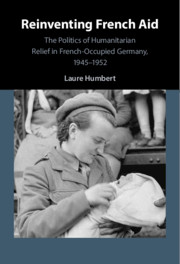Book contents
- Reinventing French Aid
- Reinventing French Aid
- Copyright page
- Dedication
- Contents
- Figures
- Acknowledgements
- Note on the Text
- Abbreviations
- Introduction
- Part I The Politics of Relief
- 1 The Politics of Immigration
- 2 In the Shadow of Nazi Occupation
- 3 The Politics of Neutrality
- Part II Reconstructing the Body, Rehabilitating the Mind?
- Conclusion
- Select Bibliography
- Index
2 - In the Shadow of Nazi Occupation
Making and Overseeing Displaced Persons’ Camps
from Part I - The Politics of Relief
Published online by Cambridge University Press: 20 May 2021
- Reinventing French Aid
- Reinventing French Aid
- Copyright page
- Dedication
- Contents
- Figures
- Acknowledgements
- Note on the Text
- Abbreviations
- Introduction
- Part I The Politics of Relief
- 1 The Politics of Immigration
- 2 In the Shadow of Nazi Occupation
- 3 The Politics of Neutrality
- Part II Reconstructing the Body, Rehabilitating the Mind?
- Conclusion
- Select Bibliography
- Index
Summary
This chapter traces how France’s own divisive experiences of ‘deportation’ and returns shape how DP camps were made and managed in the French zone. It makes three arguments. First, it highlights diverse cultures of encampment in the zone. Relatively large numbers of DPs lived in smaller camps and private lodgings in the zone. Discussions about the ‘curative’ effects of small dwellings for DPs amongst field workers were interconnected with broader debates about the effects of camp life in France. Second, this chapter traces significant difference in culture between French UNRRA officials, who believed in French cultural superiority and understood relief as a vehicle for restoring French prestige, and the attitudes of the majority of relief workers on the ground, who brought in more varied perspectives on relief work, which in turn changed as their interactions with DPs evolved. Third, this chapter shows that DP spaces created unique intimate interactions and frictions between French volunteers, international relief workers and DPs from various ethnicities, classes and generations. These relationships were influenced by the structure of occupation. Relief workers possessed a variety of material advantages over the local population and DPs: a minority used these to buy entertainment or goods on the black market, or engage in ‘illicit’ liaisons with DPs.
Keywords
Information
- Type
- Chapter
- Information
- Reinventing French AidThe Politics of Humanitarian Relief in French-Occupied Germany, 1945–1952, pp. 77 - 136Publisher: Cambridge University PressPrint publication year: 2021
